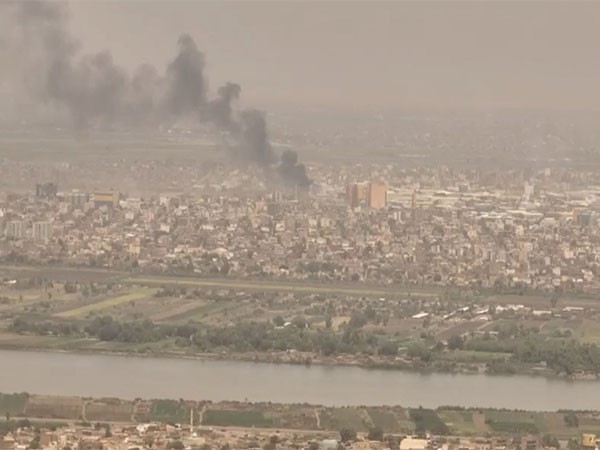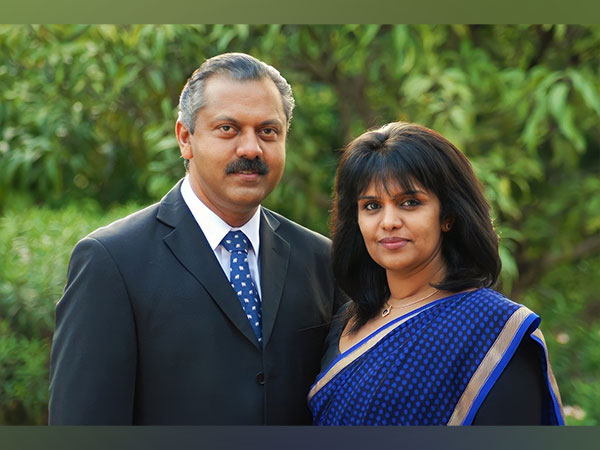
Battle rages in Central Khartoum
Sep 18, 2023
Khartoum [Sudan],September 18: Flames gripped the Sudanese capital Sunday and paramilitary forces attacked the army headquarters for the second day in a row, witnesses reported, as fighting raged into its six month. "Clashes are now happening around the army headquarters with various types of weapons," witnesses told AFP Sunday from Khartoum, while others reported fighting in the city of El-Obeid, 350 kilometers (about 220 miles) south. Battles between the regular army and the paramilitary Rapid Support Forces intensified Saturday, resulting in several key buildings in central Khartoum being set alight.
In social media posts verified by AFP, users shared footage of flames devouring landmarks of the Khartoum skyline, including the Greater Nile Petroleum Oil Company Tower - a conical building with glass facades that had become an emblem of the city. Users mourned Khartoum, a shell of its former self, in posts that showed buildings - their windows blown out and their walls charred or pockmarked with bullets - continuing to smolder.
Since war erupted on April 15 between army chief Abdel Fattah al-Burhan and his former deputy, RSF commander Mohamed HamdanDaglo, nearly 7,500 people have been killed, according to a conservative estimate from the Armed Conflict Location & Event Data Project. It has displaced more than five million people, including 2.8 million who have fled the relentless air strikes, artillery fire and street battles in Khartoum's densely-populated neighborhoods. The millions that remain in the city woke up Sunday to find clouds of smoke obscuring the skyline, as the sound of bombs and gunfire burst through the capital.
"We can hear huge bangs," witnesses told AFP Sunday from the Mayo district of southern Khartoum, where the army targeted RSF bases with artillery fire. At least 51 people were killed last week in air strikes on a market in Mayo, according to the United Nations, in one of the deadliest single attacks of the war. The worst of the violence has been concentrated in Khartoum and the western region of Darfur, where ethnically-motivated attacks by the RSF and allied militias have triggered renewed investigations by the International Criminal Court into possible war crimes.
There has also been fighting in the southern Kordofan region, where witnesses again reported on Sunday artillery fire exchanged between the army and the RSF in the city of El-Obeid. 'Anywhere but here' In Port Sudan, hundreds lined up at dawn to try and get their passports renewed or issued. Passport offices had shuttered their doors since the first signs of shooting on April 15. Since the authorities inaugurated a new passport office in the eastern city of Port Sudan in late August, hundreds of people have lined up all day, every day.
They are desperate to obtain paperwork that will allow them to leave Sudan's deadly war behind. Asked where she intended to go, Marwa Omar, who had lined up for 15 hours to no avail, replied: "Anywhere but here. This isn't a country any more." "There's nothing left. We can't live or put food on the table or educate our children," the mother of four said. Like Omar, many have flocked to the coastal city, which has so far been spared in the fighting and is now home to government officials, the United Nations and Sudan's only functioning airport.
"I was in Atbara for two months, but when I heard they were issuing passports again I came to Port Sudan," said Salwa Omar. But days go by and only a lucky few manage to get inside the building to hand in their paperwork, as others like her wait outside for their turn. "If you know someone inside who will get it done for you quickly, come. Otherwise, don't bother," Marwa Omar said, frustrated by the long wait and poor organization. 'It's all wrong' Those lucky enough to get inside the building have to enter "a cramped room, terrible heat and no chairs", another applicant, Shehab Mohammed, told AFP.
"You have elderly people leaning on their canes for hours or sitting on the floor. It's all wrong." Over the noise of dozens of people trying to push their paperwork through, Fares Mohammed, who came to get a passport for his child, said: "At this rate, we'll be here for months." Those who could scramble enough money together to make it to Port Sudan are burdened with skyrocketing accommodation and food costs. They also must stump up the fee to issue the passport: 120,000 Sudanese pounds ($200), which was the average monthly salary before the war.
Nour Hassan, a mother of two, is willing to pay whatever it takes to get passports for her children. Every day she waits from 5:00 am until 9:30 pm, clutching her family's file of paperwork. The goal, she told AFP, is to make it to the Egyptian capital Cairo, where she has family. Like many of the more than 310,000 people who have already crossed Sudan's northern border into Egypt, Hassan assures herself it's only "a temporary solution". They will stay only until it's safe enough to come home again. - AFP
Source: Kuwait Times






